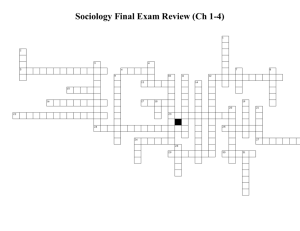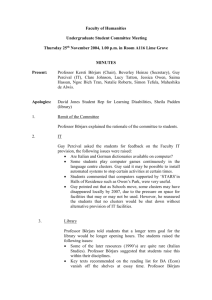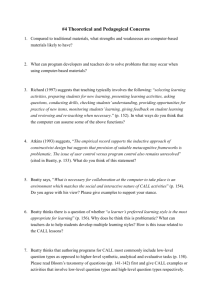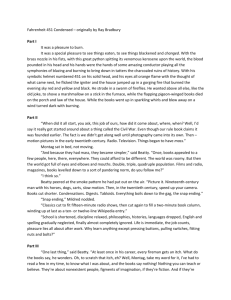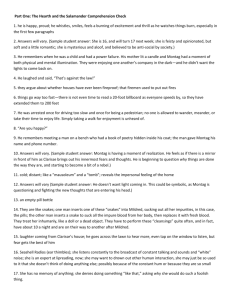Discussion on pages 48-68 of Fahrenheit 451 lesson
advertisement
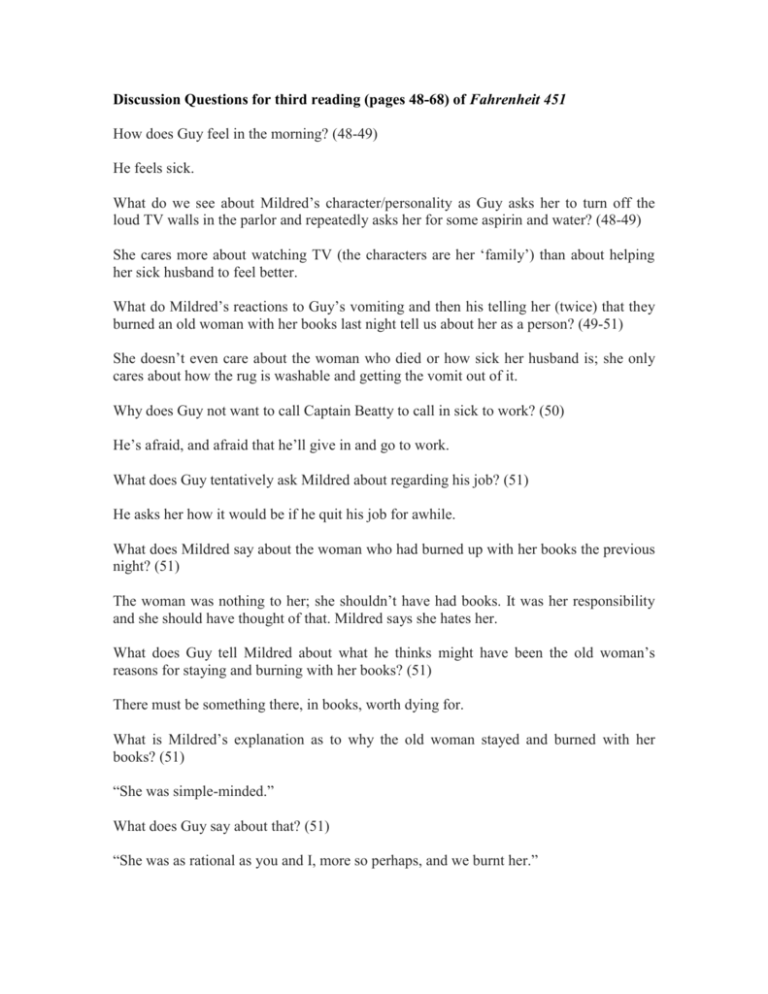
Discussion Questions for third reading (pages 48-68) of Fahrenheit 451 How does Guy feel in the morning? (48-49) He feels sick. What do we see about Mildred’s character/personality as Guy asks her to turn off the loud TV walls in the parlor and repeatedly asks her for some aspirin and water? (48-49) She cares more about watching TV (the characters are her ‘family’) than about helping her sick husband to feel better. What do Mildred’s reactions to Guy’s vomiting and then his telling her (twice) that they burned an old woman with her books last night tell us about her as a person? (49-51) She doesn’t even care about the woman who died or how sick her husband is; she only cares about how the rug is washable and getting the vomit out of it. Why does Guy not want to call Captain Beatty to call in sick to work? (50) He’s afraid, and afraid that he’ll give in and go to work. What does Guy tentatively ask Mildred about regarding his job? (51) He asks her how it would be if he quit his job for awhile. What does Mildred say about the woman who had burned up with her books the previous night? (51) The woman was nothing to her; she shouldn’t have had books. It was her responsibility and she should have thought of that. Mildred says she hates her. What does Guy tell Mildred about what he thinks might have been the old woman’s reasons for staying and burning with her books? (51) There must be something there, in books, worth dying for. What is Mildred’s explanation as to why the old woman stayed and burned with her books? (51) “She was simple-minded.” What does Guy say about that? (51) “She was as rational as you and I, more so perhaps, and we burnt her.” What does Guy try to convey to Mildred about the fire the previous night and how it has affected him? (51) It will haunt him forever. What does Guy say to Mildred about why he became a fireman? (51) His grandfather and father were firemen; he ran after them in his sleep; he didn’t even think about it. What does Guy tell Mildred he has recently thought about, for the first time, regarding books? (51-52) A man (or woman) is behind each book; she or he had to think each up each book, and take a long time time to write it down on paper. When Guy asks Mildred if she’s ever been really bothered about something important, something real, what does Guy remember, and then realize about Mildred? (52) He remembers Mildred’s suicide attempt, and that that Mildred, the one who had tried to commit suicide, was so deep inside this woman, and so bothered, really bothered, that the two women had never met. Who shows up at Guy’s and Mildred’s house? (52) Captain Beatty. When Captain Beatty tells Mildred to shut off the televisions, how does Mildred respond, and why do you think she responds differently than when Guy had asked her to do the same thing? (53) She runs to do it. She doesn’t care that much about what her husband thinks or feels, but she is afraid of Captain Beatty. What does Captain Beatty seem to believe about why Guy didn’t show up for work, and what does Captain Beatty believe Guy needs to be able to come back to work? (53-54) At some point every fireman needs understanding of why they do what they do, the true history of their profession. What is Beatty’s explanation as to the origin of their profession? (54-59) People’s attention spans just got shorter and shorter, they cared less and less about being smart; everything became about doing things more quickly and efficiently, and being entertained as easily as possible, condensing everything. It was only after everyone had stopped reading that the government decided to outlaw books and start burning them. How does Guy feel when Mildred keeps patting his pillow, and why does Guy feel that way? (55) His heart jumps again and again; a book is hidden under it. How does Mildred react when her fingers touch the book hidden under the pillow? (56) She freezes; she is stunned. What does Guy do to get Mildred to not reveal to Captain Beatty the book Guy’s hidden under his pillow, and how does Mildred react? (56-57) He heaves back against her arms and shouts at her to sit down because they’re talking; she jumps away and then she is quiet. According to Captain Beatty, why did writers stop writing anything controversial? (57) Because the more people you upset, the fewer people would want to read your work, so as a matter of making money you’d try to appeal to as many readers as possible and not risk offending any of them. What does Capt. Beatty say about how the word ‘intellectual’ became a swear word? (58) Basically it was like the way it is in school were the smart kids are targeted for mockery and cruelty by those who are not as smart as they are; people resent those who are smarter than they are, and so when the schools began focusing on helping graduates do non-intellectual jobs, ‘intellectual’ became a swear-word. What does Captain Beatty say that people in our country want most of all? (59) People want to be happy. When Guy is reading Mildred’s lips, and hopes that Beatty does not turn and look at her and read her lips, too, what do you think Mildred is saying? (59) She’s talking about the book Guy hid under his pillow. What do we find out about how this society deals with people’s deaths? (59-60) Funerals are unhappy, so they immediately burn everyone who dies; helicopters come and take them away minutes after their deaths and drop them off to the nearest incinerator to be cremated. What does Beatty tell Guy about the McClellan family? (60) They’ve carefully watched and suspected them for years but never found a book; the girl was a time bomb (the family was feeding her subconscious) and she is better off dead. What does Beatty say about when children now start going to school, and why? (60) They lowered the kindergarten age more and more until they’re almost snatching them from the cradle, because the home environment can undo a lot of what you try to do at school. What does Beatty tell Guy about what it takes to make people feel happy and brilliant? (61) They need to feel stuffed full of facts, but not have two sides to any question to have to consider. What kind of ‘facts’ does Beatty say people feel happy knowing, and what kinds of knowledge should be avoided if one is to remain happy? (61) Trivia and factoids (song lyrics, state capitals, how much corn Iowa grew last year), facts that don’t ever change; they should avoid knowledge that is ‘slippery stuff’ like philosophy or sociology. What does Beatty say about what happens to every fireman at least once in his career? (62) He gets the itch to read books and find out what they say. What does Beatty tell Guy about the few books he has read to know his business? (62) They say nothing real, if they’re fiction, since they’re about nonexistent people, or if they’re non-fiction they’re all philosophical and political arguments. They say nothing and after reading them you feel lost. What does Beatty say about what happens if a fireman “accidentally” takes a book home with him? (62) They let him keep it for twenty-four hours; if he doesn’t burn it by then they come and burn it for him. When Beatty asks Guy if they’ll see him later that night at the firehouse, what does Guy think to himself? (62-63) “I’ll never come in again.” What had Clarisse once told Guy about what her uncle had told her about porches, and why people say it is that there are no longer any porches, versus the real reason why? (63) People once had porches and sat and rocked and talked at night. Architects stopped designing them supposedly because they didn’t look good, but that was a rationalization for the real reason: they didn’t like that people would sit out there and rock and talk, because this was the wrong kind of social life. That kind of socializing and thinking was dangerous to the new social order. When Guy tells Mildred it’s only a step from not going to work today, to not going to work tomorrow, to not ever working at the firehouse again, what does Mildred ask? (64) “You are going to work tonight, though, aren’t you?” When Guy says he has an awful feeling like he wants to smash things and kill things, what does Mildred suggest he should do, and how does she feel about it when she does it? (64) She suggests he takes the beetle (the car) and drive ninety-five miles an hour or so; sometimes she goes and drives that way all night and hits rabbits and dogs and it’s fun. What does Guy tell Mildred about happiness and what is her reply? (65) Happiness is important. Fun is everything. And yet he realizes he is not happy. She replies by saying that she is happy, and she’s proud of it. What does Guy reveal to Mildred about what he has hidden behind the grille of the airconditioning system in the front hall? (65-66) He reveals that he has hidden many books there. How does Mildred react? (66) She freaks out and then grabs a book and runs with it to the kitchen incinerator to burn it. What does Guy tell Mildred about why they can’t burn these books just yet? (66) He wants to look at them at least once. If what Beatty had said was true, they’ll both burn the books together. What does Guy plead with Mildred to do to help him, to help both of them? (66-67) He wants her to help him by letting him read these books in the next day or two and figure out what they mean. What does Guy tell Mildred that he realized when he mentally compared Clarisse and his co-workers, and about what might be for the best? (67) Guy realized that he doesn’t like the other firemen, or himself, and maybe it would be for the best if the firemen themselves were burned. When the front door voice informs them that someone is at the door again, how do Mildred and Guy react, and why do they react this way? (67-68) They are both terrified (they assume it’s Beatty). They decide not to answer the door. When Guy reads aloud a line at random from one of the books, how does Mildred react, and how does Guy respond to that? (68) She says, “What does it mean? It doesn’t mean anything! The Captain was right!” Guy responds by saying that they should start over again at the beginning. Do you think that Beatty’s description of how their society got to where it is seems like a fairly realistic and possible course that our society might well end up taking, or not? Answers will vary. Where in our society today do you see people condemning others for being ‘too intellectual’? Answers will vary. In what ways is popular media—news as well as entertainment—providing people with distractions, with chances to participate in choices that don’t really matter, a natural consequence of which is that people will have less time and brain-space to devote to things of greater importance? Answers will vary. http://en.wikipedia.org/wiki/Amusing_Ourselves_to_Death Mark Twain once wrote or said, “The man who doesn’t read good books has no advantage over the man who can’t read them.” In our society, we do have some illiteracy, but we also have many more people who are able to read, yet who choose not to read books, and others who only read the books they are required to read in school. It is not illiteracy but aliteracy; they can read but choose to read as little as they can get away with, which in some cases is not reading any books at all. What do you think about this idea that Bradbury proposes in this book, that our nation’s problem is not so much illiteracy—that some Americans are unable to read—as it is aliteracy: that many Americans choose not to read? Answers will vary. http://en.wikipedia.org/wiki/Functional_illiteracy http://en.wikipedia.org/wiki/Aliteracy


